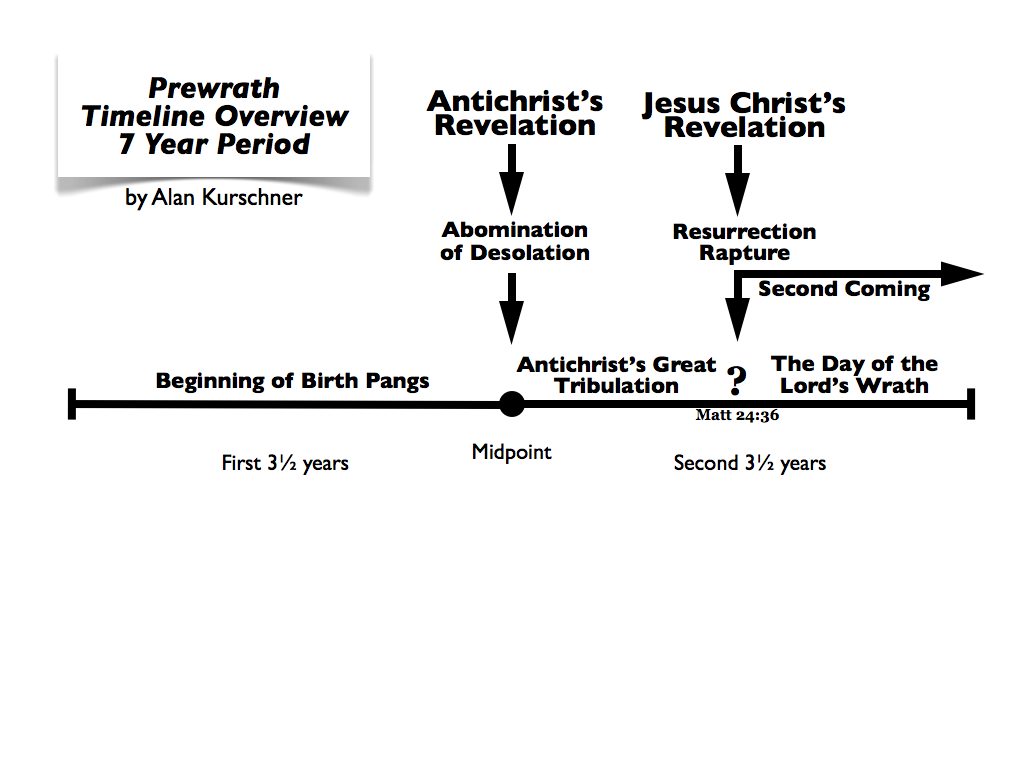I am making available this basic prewrath timeline chart for anyone. Here is the link to the image. Or you can right click the image and download it.
Prewrath
An Interpretation on Daniel 7 to Consider
http://bibleprophecytalk.com/?p=92
Does Revelation 3:10 Support Pretribulationism?
One of the most debated verses in the book of Revelation is Revelation 3:10. The Philadelphian church is given a promise: “Because you have kept my admonition to endure steadfastly, I will also keep you from the hour of testing that is about to come on the whole world to test those who live on […]
Matthew 24:37–41 “One Will Be Taken And One Left”
(37) For as were the days of Noah, so will be the coming of the Son of Man. (38) For as in those days before the flood they were eating and drinking, marrying and giving in marriage, until the day when Noah entered the ark, (39) and they were unaware until the flood came and […]
A Response to the Preterist Interpretation of “This Generation” in Matthew 24:34
“Truly, I say to you, this generation will not pass away until all these things take place.” —Matt 24:34 This is the go-to proof text for preterists. It is the holy grail of preterism. It is the first and last thing that comes out of their mouths when you talk to them about the Olivet […]
Debate: Marvin Rosenthal (Prewrath) vs Dave Hunt (Pre-trib)
I am going to briefly comment on this radio debate between Marvin Rosenthal and Dave Hunt. I would have preferred this to be a formal radio debate with rebuttals and cross-examination and the moderator enforcing time limits. Instead it was a back and forth debate. But you take what you can when you have an […]
Part 2 – Response to Preterist Gary DeMar
I continue my response to Gary DeMar and his blog post. The title of his article reads, “You’re Not Getting Raptured Out of Here. Deal With It.” I can actually affirm this title, but for an opposite reason that DeMar does. What DeMar means by this is he does not even believe the Bible teaches […]
Part 1 – Response to Preterist Gary DeMar
Gary DeMar, who is a preterist advocate from the American Vision worldview ministry, posted today this surface-level critique of the prewrath position. Actually, it was not so much a critique of the prewrath position as it was more a drive-by rambling against futurism. Gary DeMar is not a scholar, he is a popularizer, but that […]
Interviewed on Whether Matthew 24 Applies to the Church
Today, Chris White interviewed me on the subject of the applicability of Matthew 24. Does it apply to the Church or does it apply to “Jewish believers during the tribulation period” as pretribulationists claim.
Does Jesus Intend a Chronology in His Parable of the Wheat and Weeds?
There are at least three common questions that arise when people study the parable of the Wheat and the Weeds in Matthew 13. The first question is whether we are able to identify the wheat and weeds. I argue in a forthcoming book that responds to posttribulationism that the parable is not a picture of […]
Part 6 – Why the “Coming” in Matthew 24:36–44 Refers Back to Verses 30–31
This is the last installment of our six-part series. The last reason why verses 36–44 refer to the immediate context of the coming in verses 30–31 is found in a helpful parallel passage in the gospel of Luke. The passage in Luke 17:22–37 parallels Matthew 24:23–41. Luke reads: (22) Then he said to the disciples, […]




